Thinking about enhancing your link-building strategy or hiring a team of experts?
The big question on everyone's mind: What’s it going to cost you in 2026?
I run the SEO link building agency Editorial.Link, and I’m always curious about this because it helps me see where the market’s heading.
Let’s break it down.
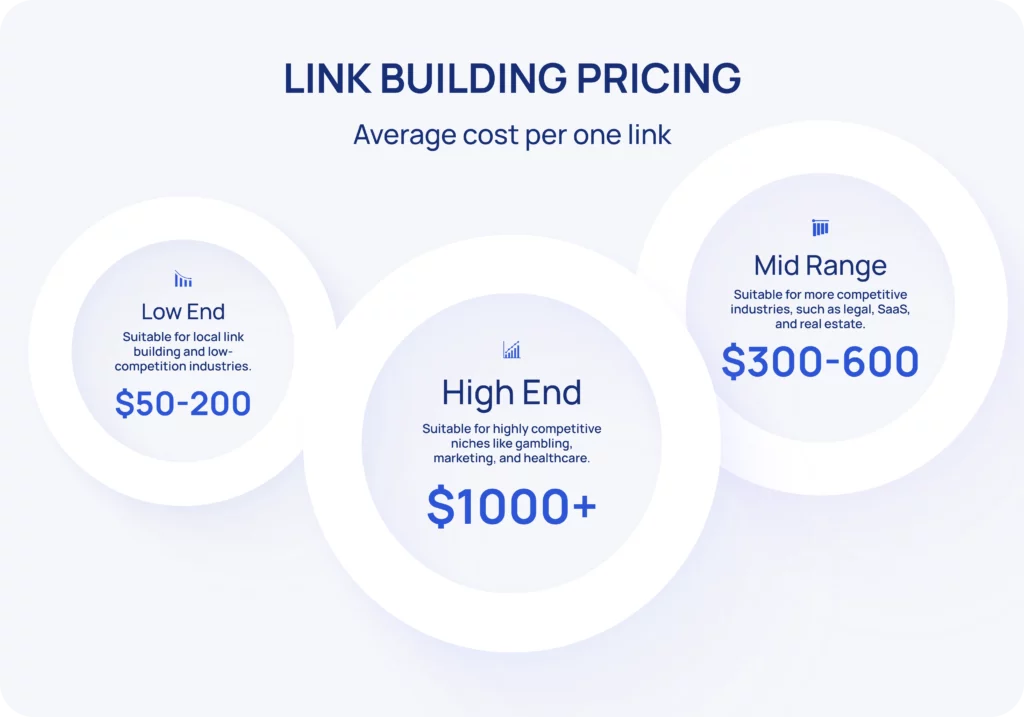
🤔 Link Building Cost: What to Expect?
Let’s break it down. We spoke to top industry experts to get the real scoop.
First up, our research shows that $508.95 is the average price SEOs consider acceptable for acquiring one high-quality backlink
Sounds steep? Just wait.
Take Patrick Whitener, for example. His podcast link-building campaign cost $4,520 for 14 links over two months. That’s an average of $332.82 per link.
According to Buzzstream’s research, the average cost of a guest post is $220, while a high-quality guest post can reach up to $609. For paid link insertion, the typical price is $141.
Quite the investment, right?
According to Ahrefs, placing a link on a website with a Domain Rating (DR) of 50+ can cost around $600.
Talking about experienced link builders…
At Editorial.Link, our prices start at $1,750 for 5 links per month. Perfect if you’re just starting out 😉
Link building isn’t cheap, and it might not suit every business:
- According to Siege Media, link building pricing can vary from $100 to over $1,500 per link, depending on your industry.
- Typical campaign budgets range from $5,000 to $20,000 per month and are often linked to content marketing efforts with additional performance metrics.
Quality links in high-value verticals like legal and finance can cost $800-$1,000 or more. In industries like casinos, payday loans, and crypto, the costs can go even higher due to the competitive nature and high value of these sectors.
Conversely, if you’re in a lower-value vertical such as hobbyist sites or education, costs can drop significantly, often falling below $100 per link.
Intrigued? Let's explore the ins and outs of link-building costs for 2026.
🏆 Real Pricing for Link Building in 2026
So how much are businesses investing in link building these days?
Based on our 2026 Link Building Statistics report, here are some key points to consider:
- The average price SEOs are willing to pay for a single high-quality backlink is $508.95.
- 80.9% believe link building will become more expensive over the next 2 to 3 years.
- $8,406 is the average minimum monthly budget needed to stay competitive in high-difficulty niches.
- 61.0% say the gambling industry requires the largest link building budgets.
- Agencies allocate about 32.1% of their total SEO budget to link building, while in-house teams invest even more — 36.03% on average.
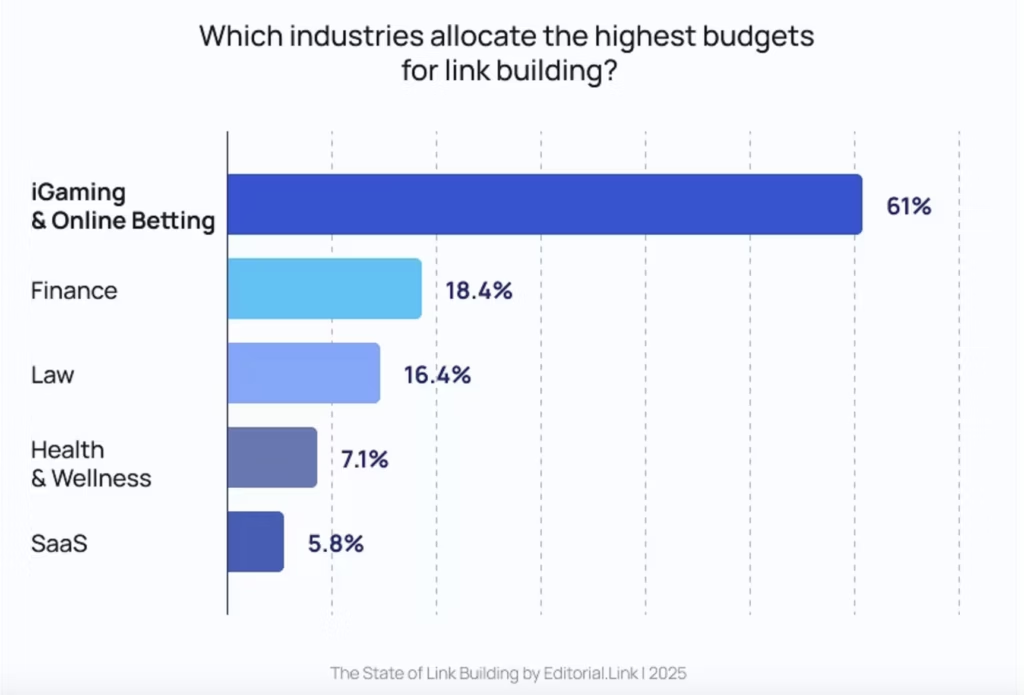
In-House vs Agency Costs
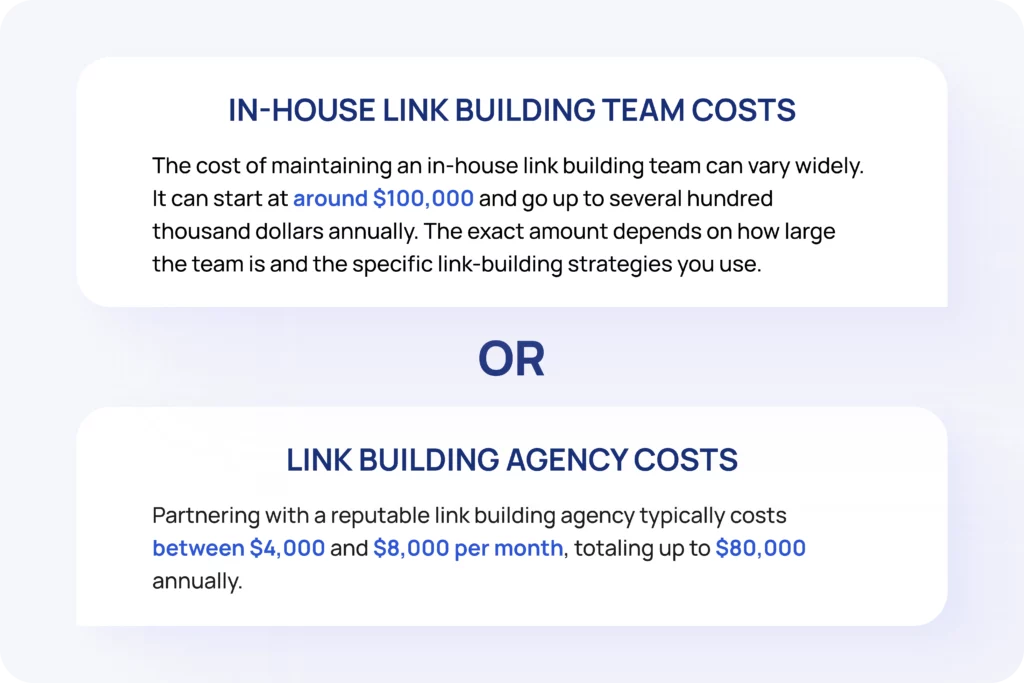
To budget effectively, you need to know what link building really costs.
Here's how in-house teams compare to agencies.
In-house team costs
Starting with an in-house team for link building is often the first move companies make. Especially, SEO teams. However, they quickly realize that link building is a full-time job that needs dedicated experts.
So, what’s the cost of building an in-house team of link builders?
According to Glassdoor, hiring a full-time SEO link-building specialist in the U.S. costs between $53,000 and $98,000 per year.
When you add benefits and overhead, the real cost is about 1.4 times the base salary. This means an average salary of $63k+ per year turns into roughly $98,000 annually, or $7,300 per month. If you’re planning on paid link-building partnerships, these costs can double.
Training is another big expense. If your new hire isn’t familiar with your niche, you’ll need to invest time and effort to get them up to speed.
At GetProspect we tried to hire an in-house link builder several times. It took a lot of time to find and train a specialist. Here was the main problem — many link-builders had experience with black hat SEO and they couldn’t understand the main key to successful outreach — building relationships with other companies and specialists.
Also, consider the cost of tools for outreach and backlink monitoring.
For example, GetProspect uses:
We are using a few tools for in-house link-building:
- GetProspect email finder is obviously free for our team, but in general, it starts from $49/month;
- Woodpecker for emailing – $29/monthly;
- Ahrefs – $199;
- Airtable for consolidating – $20;
- In-house scripts for Airtable – free.
Total – $297.
These costs are for a small-scale operation. As your needs grow, so will your expenses.
Link building agency costs
Partnering with a reputable link-building agency can yield great results, but it comes with a substantial investment.
Alexandra Tachalova, CEO and Founder of Digital Olympus, explains:
Link building is the biggest waste of money IF it doesn’t help your brand stand out and create the right connections on the web that prove your site is a legitimate brand. At Digital Olympus, we don’t just build links; we build strong brand entities with the help of the right links.
Our pricing at Digital Olympus ranges from $500 to $900, depending on the pages we need to build links to. Additionally, we have a minimum contract engagement that starts from $40,000.
Our pricing model is based on the quality of services we deliver and the overall complexity of the process when it comes to acquiring links on sites that help our clients establish strong brand entities. We primarily work with significant budgets and well-known brands interested in enhancing their brand’s authority rather than merely enriching their backlink profiles.
Some agencies have lower minimum spend per month, or none at all, like we at Editorial.Link. For example, Dofollow requires clients to spend at least $4,000 per month for 4-5 links.
Our research shows that link building is a major monthly expense for many, and 80.9% expect it to get even more expensive in the next 2–3 years.
Guillaume Deschamps, Digital PR Manager at uSERP, adds:
We conducted research at uSERP where 46.5% of the respondents spend $5,000 to $10,000 a month on link building, and 18% spend more than $10,000 only on links.
You can work with freelancers or agencies, but the price you’ll pay for link building really depends on the service provided, what are your needs but also where you’ll get your links from. For example, if you want to rank for competitive keywords and outrank brands like Forbes, Hubspot or Investopedia, you’ll definitely need to spend more and for a long time. Nothing is impossible, but your budget needs to be aligned with your goals.
You can get low-quality links for 50$, but if you are looking for the ones that move the needle, and not hurt your domain, the budget spent by the SEOs in our research is the one you need to keep in mind before starting.
Prices at uSERP range from $500 to $1,000, depending on the link targets, with a minimum contract of three months. With this price, we also offer some SEO consultancy, including Competitor Gap and Anchor Text Analysis, On-Page Optimization Audits and Internal Linking Optimization, to name a few services available.
All in all, deciding between an in-house team and an agency depends on your budget, goals, and the scale of your link-building needs. Each option has its pros and cons, so consider them carefully to choose what’s best for your business.
Most Effective Types of Backlinks
The cost of link building highly depends on the techniques used to gain backlinks. Some methods, like HARO link building, require relatively little effort and fewer resources, while others, like paid guest posting, can take much more time and money.
Check out the best off page SEO techniques below and find the most cost-effective option for your project.
HARO link building
HARO link building is all about earning backlinks by answering journalist requests. In April 2025, Featured.com brought the platform back to life, making this strategy a go-to again for PR and SEO pros.
HARO can be effective if you're willing to put in the time and effort. The number of links you get depends on the opportunities available and the quality of your submissions.
Danny Browne, Director at HARO Links, shares:
HARO can be an effective channel, providing you put the time and effort in. The amount of links you can build through HARO vary based on the amount of opportunity there is and the quality of your submissions.
HARO is a slow burner, but it can be really great in getting some highly relevant contextual links that are excellent in supporting your EEAT efforts, in my opinion, it’s totally worth the effort, and is great to supplement your other link-building campaigns with to give your backlink profile a bit of variety.
It’s hard to give an estimate really on how many links you can get per month, but I get on average between between 3 and 9 per month for a client, but it depends on the client and the amount of opportunities available. In terms of pricing, again it all depends on the model you go for, I normally charge around £1000 per project.
A lot of link builders rely on HARO for a steady stream of high-quality backlinks. But its popularity has made some content writers skeptical, and as a result, some top publications no longer use the platform.
The great thing about the platform is that it gives you access to a wide variety of topics and niches. On the flip side, it doesn't track mentions, so you'll need to keep an eye on each submission yourself.
Is HARO worth it for link building?
Sure thing!
It's free, doesn't require much content creation, and can get you into high-quality publications. However, it mainly builds links to your homepage and needs insights from your internal experts, with no clear timeline for when the links will go live. So keep this in mind.
Guest posts
Guest posting is still a go-to link-building technique. It involves writing articles for other websites and including a link back to your site. It's one of the safest ways to get natural links, however, it can also be quite resource-intensive.
Here’s what Nebojsa Jankovic, CEO at Heroic Rankings, has to say about guest blogging:
The easier for the user to make a link, the less the reward.
You can leave a comment in less than a minute with a link on a website. But in order to publish a guest post, you need to research, write, edit it, format it, and wait for the editorial team of that specific website to publish it. This can sometimes take up to a month. Hence, the more time you invest, the greater the reward.
I would say that the highest impact on your keyword position has guest posting and niche edits.
The cost and effectiveness of guest posting can vary.
Writing a 1,500-word article for just one link takes a lot of time and isn't very scalable. So, what’s the alternative? Many pros use a 3-way link exchange through guest posting.
They exchange links by featuring each other in blog content.
It’s a way to turn one guest post into links from multiple domains.
Editorial backlinks
An editorial backlink comes naturally from a reputable publication. When you publish unique, valuable content on your site, other reputable sources link to it because it benefits their readers.
To be honest, the most cost-efficient link-building tactic has always been creating high-quality content that naturally attracts links. You don’t even need to invest a lot of money to create extensive reports. Sure, it always pays to invest a lot in getting people to complete a survey [see the Buffer Remote Work report example and how it got them close to millions of backlinks].
However, I’m mostly working with bootstrapped companies where there’s simply no budget to dedicate to this. So I try to stay creative and handle whatever research I can do myself or together with my team and clients. For instance, for a startup in the HR space, I analyzed 100 job descriptions for a particular role to compile a list of in-demand skills and responsibilities. This gave a pretty clear look at the current requirements for the role so naturally people were interested in sharing and linking to the post.
However, creating content that drives links naturally isn’t free.
According to Upwork, long-form, well-researched content like white papers can cost between $500 and $5,000. Even if you use in-house writers, it still takes time, resources, and possibly additional tools.
If you want to speed up things or need feedback from thousands of people, that’s when research and reporting costs get high. Most tools allow you to either pay as you go or get a monthly subscription [if you run surveys often]. This can easily get to over $5,000 for one report. If you’re lucky and can pull data from your own product, you can also leverage your own customer’s insights for free.
At Editorial.Link, we make this process easier. We help companies earn editorial backlinks without the hassle of creating link-worthy content.
We partner with reputable companies to earn quality placements that help our clients meet their goals. We charge from $350 per link, with no requirements for minimal contract spend. No advance payment needed.
Yet you can choose to select one of our monthly plans — starting at $1,750 for startups with 5 built links in total. The link-building package for enterprises includes 50 links for $17,500/month.
In 22 months, we gained 205 links for PandaDoc, one of our clients. Over the given timeframe, the site’s traffic has increased by 212%.
Digital PR links
In 2026, digital PR backlinks remain some of the most valued in the industry.
First, they give you a real opportunity to earn links from established media outlets, not just niche blogs.
Second, these links are difficult for competitors to replicate, which makes them a long-term strategic asset.
Third, they increase your chances of getting cited in AI search results.
According to Siege Media, in 2024, the cost of such links depends on how complex and extensive your campaign is:
- For simpler campaigns with a naturally engaging story, expect to spend between $5,000 and $10,000 a month.
- If your business needs custom content creation, the cost goes up to around $8,000 to $15,000 a month.
- For individual high-quality placements, you’re looking at about $800 to $1,200 each, though you might pay less if your content catches fire and goes viral.
Podcast links
Earning backlinks through podcasts is a relatively new approach. It involves contacting podcast hosts to either sponsor an episode for a link or appear as a guest to earn a link organically.
Getting back to Patrick Whitener here who shared his results from a two-month campaign. He spent $4,520 to gain 14 links, averaging $332.82 per link.
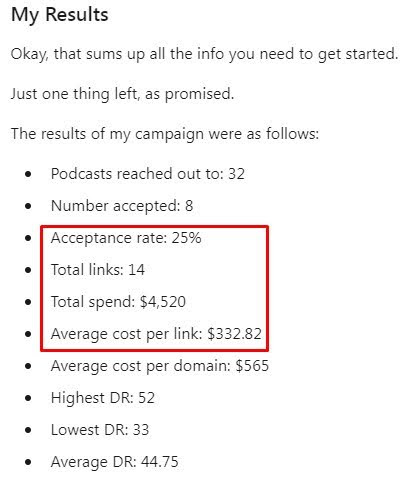
With a high acceptance rate of 25%, podcast link building proves to be a worthwhile strategy.
Relationship-based link building
This white hat method focuses on building strong relationships with other content teams or link builders to earn backlinks almost for free.
Tamara Omerovic, Marketing Consultant for B2B SaaS brands, explains:
If you want to build quality links, you need to build relationships with other companies. Once you establish trust, it’s easy to use more traditional methods of link building like guest posting, or A-B-C link exchanges, but you could also do much more and, for example, run a research report together, create an infographic… The options are basically limitless.
But everything starts with connecting with people who have the same goal as you, partnering with them (long-term), and working together toward mutual success. Also, this method is 100% free and can seriously help you scale your link-building without investing additional resources.
Relationship-based link building cuts out the need for paid guest posts or link placements. However, it does require having a link-building expert on your team or covering agency costs.
Factors That Impact Cost Per Link
What else drives up the price of your link-building project?
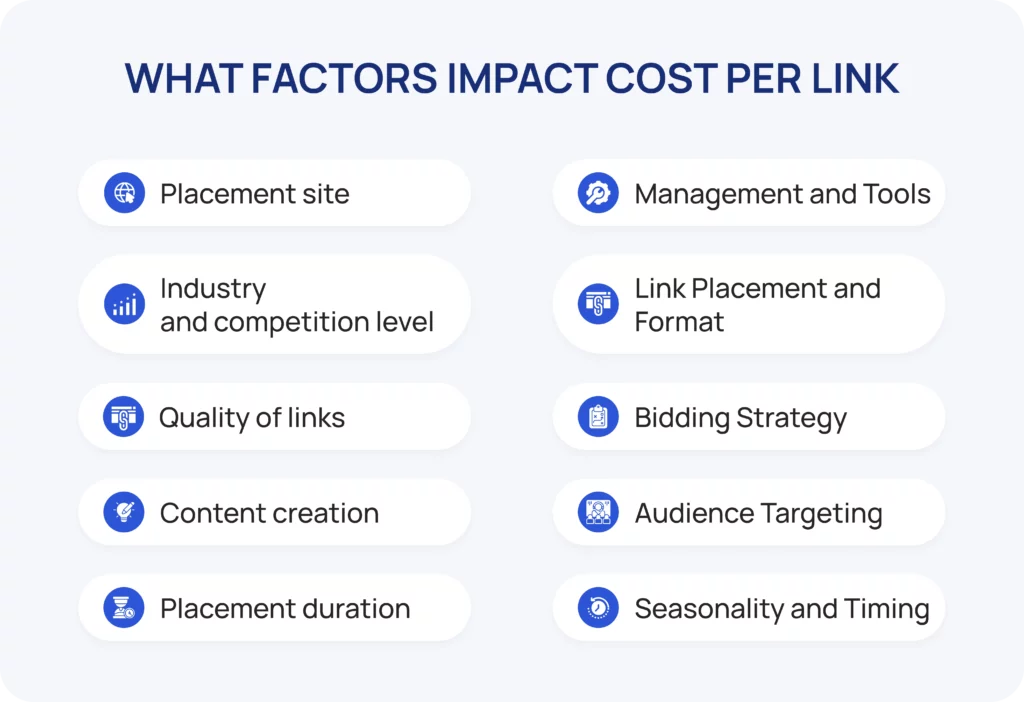
Check out a few more factors below.
Placement site
Where you place your link is key. According to Nebojsa Jankovic, high-authority sites charge more because they have more traffic and influence on SEO.
The authority of the website where the link is placed heavily influences cost. High-traffic, reputable sites typically charge more for link placement due to their greater reach and impact on SEO.
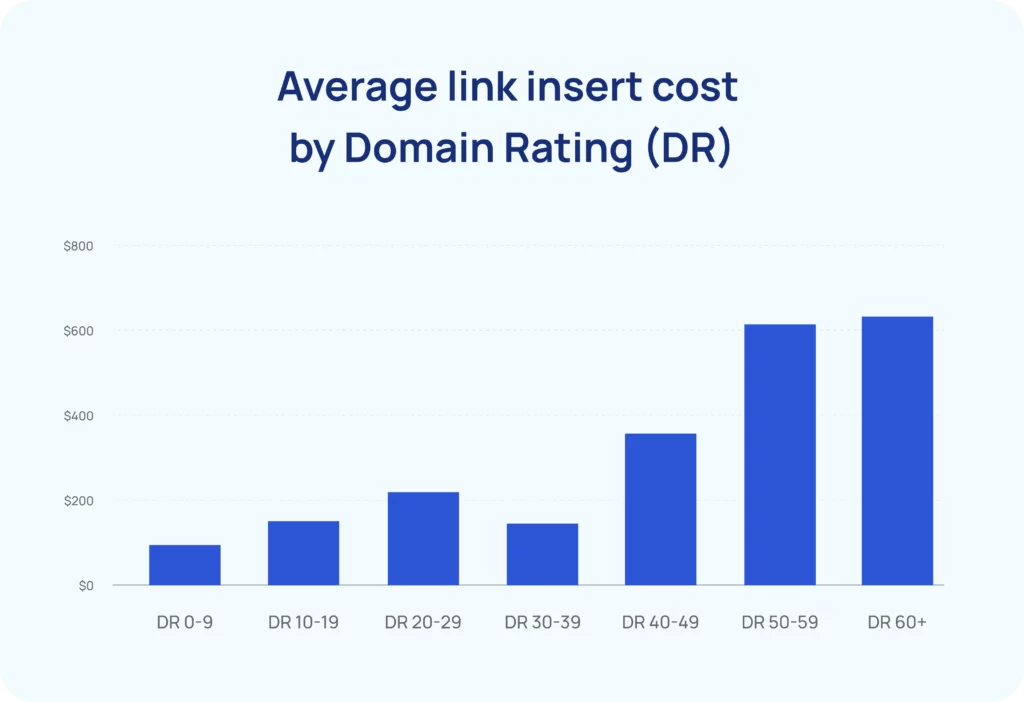
For example, insights from Ahrefs reveal that a site with a 60+ domain rating might charge over $600 per link.
Industry and competition level
Your business sector can really impact costs. In highly competitive fields like finance and insurance, link costs shoot up because everyone’s vying for those top spots.
On average, links in competitive niches cost about $361.44 (Ahrefs). In niches like fashion and finance, site owners are often less willing to accept link insertions, which can hike prices even more.
Quality of links
You get what you pay for with links. Sure, you can get hundreds of links for $50. But will those really boost your site's authority? Nope, they won’t.
In January 2024, we asked 12 digital PR agencies like Search Intelligence, SiegeMedia, and Builtvisible about their pricing. They told us that a PR campaign usually costs between $6,000 and $20,000, and you can expect to get 10 to 40 editorial mentions from it.
If you want top-notch, relevant links, be ready to spend more. On reputable sites, a single high-quality backlink can easily go for over $1,000.
Why do these links cost so much? It’s all about quality.
The quality, which includes factors like relevance, context, and the anchor text used, is very important. High-quality, contextually relevant links from authoritative sites cost more but are more effective in boosting search rankings.
Content creation
Even if placing a guest post on someone else’s site is free, it doesn’t mean it’s cost-free for you. Often, it's more cost-efficient to pay $300 for a direct link insertion than to spend days writing a guest post.
Plus, about half of high-authority websites that accept guest posts actually charge for it.
If the link placement requires quality content creation, this can add to the cost. I am not sure why, but I found people charge more if you want to publish a guest post than do a niche edit. It doesn’t make sense because:
- you need to pay your writer to craft that content;
- the publishing website gets free content that can actually rank.
Nebojsa Jankovic finds this odd too, but it’s a common practice in the industry.
Placement duration
Backlinks can disappear if the site owner doesn’t guarantee how long they’ll stay up. To ensure your links are permanent or last longer, you’ll likely need to pay extra.
Sometimes, websites limit your link’s expiration, so permanent links or those with longer placement durations can cost more than temporary or short-term links.
Tools
Let’s not forget about the tools. Link-building agencies rely on a ton of different tools to do their job well. As these agencies grow, so do their tool expenses.
For instance, here at Editorial.Link, we shell out $42,490 a year just for Ahrefs.
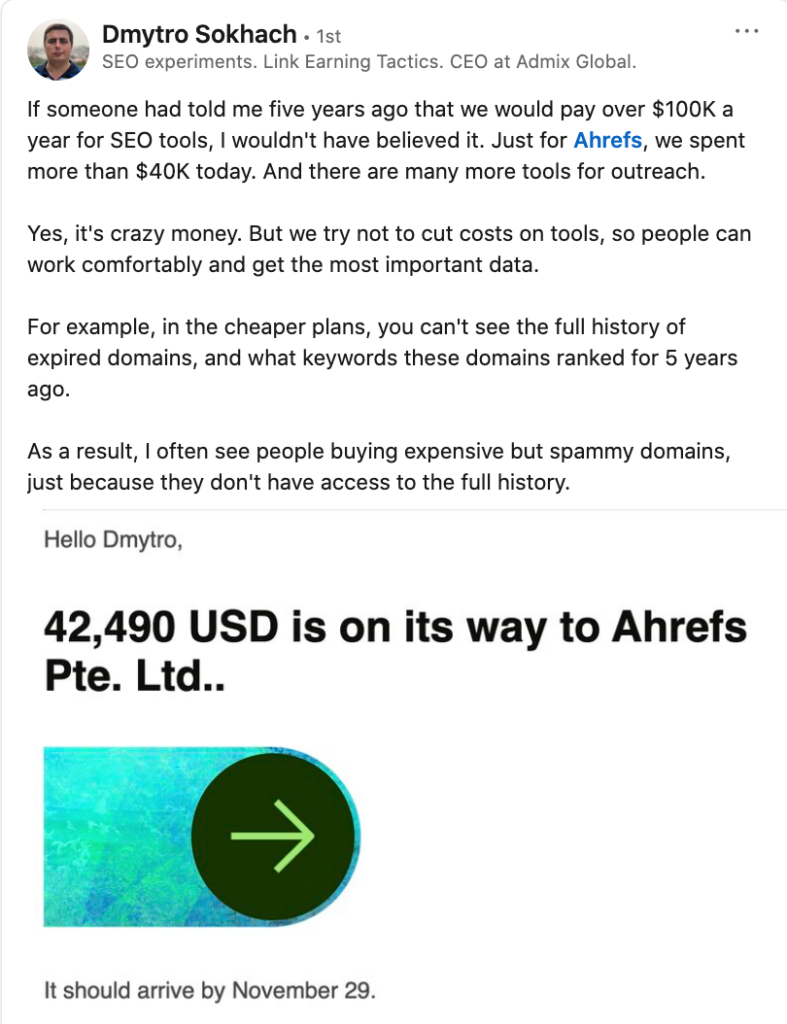
Our CEO, Dmytro Sokhach, recently shared a list of the many other tools we use to get top results for our clients.
From keyword research to outreach and optimization, these tools play a big role in the overall cost of link building. So, it’s something you definitely want to keep in mind when budgeting for your link-building projects.
Bidding strategy
How you secure links can really impact your costs. You might spend more upfront if you’re manually building links and aiming for high-authority sites.
But, if done right, this approach can yield better long-term returns on your investment. However, it does require constant tweaking and expertise, which adds to the overall expense.
Audience targeting
If you’re aiming for a super-specific audience, you might pay more per link. The upside is better engagement and higher conversion rates, making your campaign more efficient.
When you’re zeroing in on a niche crowd, the relevancy and context of the linking site become even more critical, and this can push up the costs.
Seasonality and timing
The cost of link building can fluctuate throughout the year. Prices tend to jump during peak times, like major industry events or key sales periods such as Black Friday.
To keep your costs down, try to plan your link-building activities outside of these high-demand periods.
Link placement and format
A link within the main content of a high-authority article is generally more valuable—and more costly—than one tucked away in a sidebar or footer.
Articles featuring rich media content, like videos and images, also come with a higher price tag due to their greater impact on SEO.
Is Link Building Really Worth The Price?
You bet it is.
Quality backlinks boost your site’s authority and improve your rankings, drawing in more potential customers.
So, should you hire an in-house link builder or outsource to an agency?
Here’s some expert advice:
Elena Osipova, Head of SEO at GetProspect:
We still build links in-house, but the main focus is on editorial links now. We outsource link building to a few agencies, too. It’s the best experience so far.
Tamara Omerovic, Marketing Consultant for B2B SaaS brands:
We have collaborated with 2 link-building agencies in the past, but not by hiring them, but by forming a partnership. They had access to a variety of websites that were a good match for us, and in return, we gave backlinks to their clients on our own website.
This was very successful for us because we eliminated cold outreach and were able to secure links to product pages that are hard to obtain naturally.
If you're looking to climb those search rankings with top-notch backlinks, we've got you covered.
At Editorial.Link, we're your go-to team for link building. Let us help you earn those high-quality editorial backlinks!











